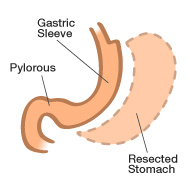BARIATRIC SURGERY OVERVIEW
Bariatric surgery originated in the 1950s, though research and development has offered increasingly better options for patients. These include new procedures which employ laparoscopic techniques and are less invasive than traditional bariatric surgery. Any surgery option targeted at weight loss or treatment of illnesses related to obesity should be discussed fully with your surgeon as each of the different types of procedures available carry their own risks and potential benefits.

WHAT IS BARIATRIC SURGERY AND WHAT ARE THE TYPES?
The term bariatric refers to any medical treatment that is aimed at treating obesity and any potentially related illnesses; in this case the treatment is surgical in nature. There are three main categories of bariatric surgery procedures:
- Restrictive (aimed at limiting the size of the stomach)
The purely restrictive procedures include the laparoscopic adjustable band (popularly known as the lap band) and the newer gastric sleeve. - Malabsorptive (aimed at decreasing the absorption of fat and/or calories)
The purely malabsorptive surgeries have become unpopular due to a number of potential long term complications. - Combination Restrictive and Malabsorptive
The combination approaches include a procedure called Roux-en-Y (or gastric bypass) and another called Biliopancreatic Diversion with Duodenal Switch (BPD-DS).
WHAT IS BARIATRIC SURGERY AND WHAT ARE THE TYPES?
The term bariatric refers to any medical treatment that is aimed at treating obesity and any potentially related illnesses; in this case the treatment is surgical in nature. There are three main categories of bariatric surgery procedures:
- Restrictive (aimed at limiting the size of the stomach)
The purely restrictive procedures include the laparoscopic adjustable band (popularly known as the lap band) and the newer gastric sleeve. - Malabsorptive (aimed at decreasing the absorption of fat and/or calories)
The purely malabsorptive surgeries have become unpopular due to a number of potential long term complications. - Combination Restrictive and Malabsorptive
The combination approaches include a procedure called Roux-en-Y (or gastric bypass) and another called Biliopancreatic Diversion with Duodenal Switch (BPD-DS).

Adjustable Lap Band

Roux-en-Y

Sleeve Gastrectomy
WHAT IS REQUIRED BEFORE THE PROCEDURE?
Due to its life-changing nature, making the decision to have surgery is only the first step; preparing is an intensive process. The surgery alters the amount of food you can eat and/or the amount that will be absorbed such that life long dietary changes must be implemented following surgery. As a result of the way this impacts your quality of life, your pre-surgery plan will include the following:
- A comprehensive psychiatric evaluation
- A thorough medical exam by your internist or primary care physician
- Dietary counseling by a registered dietician
- Instruction in an exercise program by a personal trainer or physical therapist
- 6 months in a physician supervised weight loss program (required by some insurances)
- Participation in a weight loss support group

STAYING INFORMED AND MANAGING OUTCOMES
In making your choice it will be important to consider what is required of you before and after surgery. The decision to undergo bariatric surgery should not be entered into lightly. Again, this is a life-altering procedure in many ways, and the more informed you are about the process, the better you will be to manage your expectations and outcomes after surgery. Whichever procedure you choose, and is right for you, can be tailored to meet your own needs and expectations, and should be discussed in detail with your surgeon. For specific questions regarding your insurance coverage, please feel free to contact us directly.

STAYING INFORMED AND MANAGING OUTCOMES
In making your choice it will be important to consider what is required of you before and after surgery. The decision to undergo bariatric surgery should not be entered into lightly. Again, this is a life-altering procedure in many ways, and the more informed you are about the process, the better you will be to manage your expectations and outcomes after surgery. Whichever procedure you choose, and is right for you, can be tailored to meet your own needs and expectations, and should be discussed in detail with your surgeon. For specific questions regarding your insurance coverage, please feel free to contact us directly.

